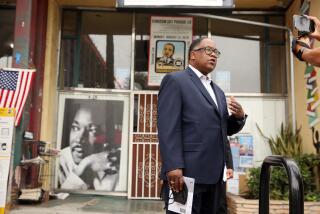Judge Reduces Robbins’ Term, Cites His Help in Ethics Probe : Corruption: Imprisoned last year, the former state senator could be released to a halfway house by fall. Prosecutors sought the reduction, calling his help invaluable.
SACRAMENTO — A federal district judge Monday reduced the public corruption sentence of former state Sen. Alan Robbins by more than half, acknowledging that the onetime San Fernando Valley political powerhouse was a valuable asset in the government’s ongoing pursuit of wrongdoing in the Capitol.
Judge Edward J. Garcia ordered that Robbins, serving a five-year term in the federal prison camp at Lompoc for racketeering and tax evasion, be released after two years. Under federal prison rules, the former Democratic lawmaker could be released to a halfway house by fall and formally discharged early next year.
In seeking the sentence reduction, acting U.S. Atty. Robert M. Twiss said Robbins’ cooperation has “enabled the government to infiltrate the corrupt relationship between lobbyist and legislator in a manner that would have been impossible with other types of law enforcement techniques.”
Robbins’ sentence reduction serves as a signal to others implicated in the wide-ranging political corruption probe that, if they aid the government, they too could have their sentences reduced.
In a courthouse interview, Twiss said other corrupt officials “have the key to the door in their hands” if they follow Robbins’ lead and cooperate. Otherwise, “we’re going slam them the best we can.”
Judge Garcia said he was concerned initially that the government proposal was overly lenient in a case involving “abuse of public trust by a highly placed public official.”
But in the end, Garcia went along with the government, saying the U.S. attorney “knows better than anyone the value of the defendant’s assistance.”
The federal grand jury probe was launched more than seven years ago and has resulted in the indictment or conviction of 14 people, including five state legislators.
Garcia noted that Robbins, who resigned from the Senate in November, 1991, had been publicly humiliated and forced from “his lofty public office,” and still must pay $475,000 in fines and restitution.
The federal judge also wanted assurances that Robbins would continue to be under court supervision for two years after his release.
As part of a plea bargain agreement, Robbins, 50, began cooperating with authorities in 1991. In a document filed with Garcia, Twiss spelled out how Robbins, who entered prison in June, 1992, helped bring several major indictments.
In one case, influential lobbyist Clayton R. Jackson was charged with racketeering, mail fraud and money laundering. He has pleaded not guilty and is set for trial in October.
During a four-month period in 1991, Robbins secretly tape-recorded conversations with Jackson, who lobbied for the insurance industry. Twiss said Robbins made the recordings despite fearing for his physical safety.
The recorded conversations are an integral part of the government’s cases against Jackson and former Sen. Paul B. Carpenter (D-Cypress).
Likewise, Twiss said Robbins was helpful in the indictment of former California Coastal Commissioner Mark L. Nathanson. In June, Nathanson pleaded guilty to racketeering and tax fraud charges and is cooperating with the government. He is scheduled to be sentenced Aug. 24.
The cooperation was not without cost to Robbins, Twiss said, noting that Robbins’ confinement was “more difficult than one would ordinarily expect.” He said Robbins was moved to the El Dorado County Jail near Sacramento for four months so he would be close to investigators. Because he was cooperating, Robbins was placed in solitary confinement. He reportedly was harassed by other inmates.
Under the deal Robbins negotiated with the government, prosecutors had to seek the sentence reduction by Aug. 1.
Robbins’ sentence can be further reduced by 54 days a year for good behavior, making him eligible for release next February. Prison authorities have the option of transferring him to a halfway house up to six months before his release.
Robbins did not appear in court but his lawyer acknowledged that he had unsuccessfully sought to reduce the financial penalties. Asked how long his client would be cooperating, Michael L. Lipman described it as “kind of a deal in perpetuity.”
In urging a sentence reduction, Lipman noted that he had turned over to authorities letters on Robbins’ behalf from his longtime constituents, family members and former state Sen. Ed Davis (R-Santa Clarita).
Robbins still faces sentencing on three counts in a Los Angeles federal case in which he admitted giving false statements on bank loan applications.
More to Read
Sign up for Essential California
The most important California stories and recommendations in your inbox every morning.
You may occasionally receive promotional content from the Los Angeles Times.










